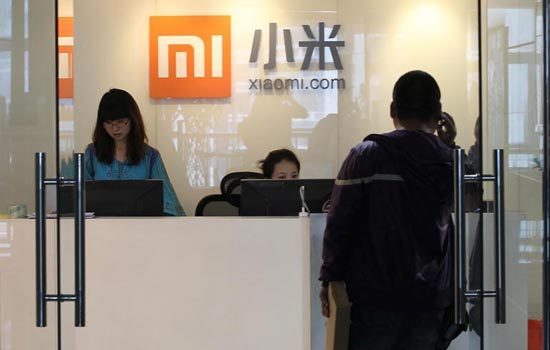Xiaomi: China's Apple Success Story?
 0 Comment(s)
0 Comment(s) Print
Print E-mail CRI, August 12, 2013
E-mail CRI, August 12, 2013
|
|
|
The front desk of Xiaomi Corp's headquarters in Beijing. [China Daily] |
Why Xiaomi?
The overnight success of Xiaomi almost caught Lei off guard. Limiting the supply of Xiaomi handsets led to media accusations of "hungry marketing". It's a practice that seeks to work up a fever for a product that becomes contagious.
Although everything is still under control and is going forward step by step, Lei admitted Xiaomi moved much faster than he expected. "We had a four-year plan but we finished it in two years," he said.
The success of Xiaomi phones is down to three things, Lei added. First, one-third of Xiaomi device-design ideas come from what users want. Second, Xiaomi sells handsets mainly through e-commerce websites, which cuts costs and helps lower the selling price. The third reason may be the most important - Xiaomi doesn't expect to make money from selling handsets but hopes to realize profits by providing software and related services, Lei said.
Xiaomi drew ideas from the Internet, gaining a reputation through word-of-mouth and sold handsets using e-commerce channels.
Roger Sheng, a Shanghai-based analyst with Gartner Inc, said one of the most important reasons why Xiaomi experienced success is because of the word-of-mouth effect promoted by millions of Xiaomi fans.
"There is no other way to purchase Xiaomi handsets except through online channels, which resulted in more people rushing to join the line-up because they're afraid of failing to get one," Sheng said.
Xiaomi's targeted customers are hardcore mobile device users. Most of them are fanatical about mobile devices, tend to be opinion leaders and like to suggest to their friends what handsets to buy.
It is true that Xiaomi paid attention to nurturing a close relationship with its customers. In addition to making smartphones, the company launched a cartoon character, the rabbit Mi-Tu, made promotional mini movies and designed special souvenirs, such as T-shirts, to attract and retain users.
Lei named April 6, the day when Xiaomi was established, as the annual carnival for Xiaomi fans. During the first event this year, hundreds of fans, invited from across the country, gathered in a small hall in Beijing's 798 art district, and chatted as if they were old friends at a reunion.
Some followers have made special music videos and add-ons for Xiaomi smartphones. Others said they had collected almost all the mobile phone cases of different colors produced by Xiaomi. "Xiaomi is the only smartphone brand that really captures my heart," said Liu Cheng, a Xiaomi user.
The 1,999-yuan classic model, together with its 1,499-yuan youth version smartphone, surprised the market at first, said Ji Chengdong, an analyst with research firm Frost & Sullivan. "Xiaomi became the first company to sell high-end smartphones at a relatively affordable price, which definitely drew the most market attention."
Shen Sui, an Internet analyst at consultancy firm iResearch, said: "Xiaomi has essentially imitated Apple's marketing strategy." Likewise, it aims to make a profit by combining the sales of hardware with its software, such as Miliao.
"The phone is clearly targeted at people on lower incomes who want a smartphone but cannot afford those priced at 4,000 yuan or more. This is a niche market that is largely ignored in the smartphone sector," Shen said.
Going global
Xiaomi will start selling smartphones in the overseas market in the second half of this year, Lei said. Rather than go to developed economies, such as the United States or Europe, Xiaomi has a more practical strategy - entering emerging markets.
It still needs time for customers in developed economies to recognize and accept a Chinese brand, Lei pointed out.
Countries such as Russia, India and Brazil may become the first destination markets for Xiaomi. "Because Xiaomi is a unique mobile phone vendor that has largely built its reputation through the Internet, we need to select markets with a good e-commerce environment and a well-established social network," Lei added.
"Similarly, Xiaomi will form a fans' group in every country in which we plan to have a presence," Lei said.
The MIUI, Xiaomi's mobile operating system based on Android, has already attracted millions of followers in 23 countries, which laid the foundation for Xiaomi's globalization.
C.K. Lu, a senior mobile device research analyst at Gartner Inc, said Xiaomi has an opportunity to penetrate markets especially in Asia, where users tend to be more cost-conscious. "But a lack of patents can be an issue for it (Xiaomi) when leaving its home market," Lu wrote in an e-mail.
Cultural challenges, limited experience in international operations and a shortage of talent are likely to be major obstacles to achieving the desired result, said Duncan Clark, chairman of investment consultancy BDA China.
Xiaomi raised about $90 million in the latest round of funding on Oct 20. The investors included Temasek Holdings, International Data Group and Qualcomm Inc. Xiaomi's total fundraising amounts to $131 million.
Lei said Xiaomi would not go public in the next five years. "If we have an IPO, we may be distracted from delivering good products," he said.
Lei said he had received no salary from the company, even though he is its CEO.
"I just hope Xiaomi will fulfill my dreams and become a world-class company. Working for Xiaomi is the last job of my lifetime."







Go to Forum >>0 Comment(s)